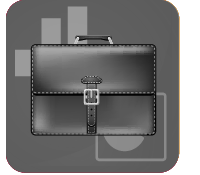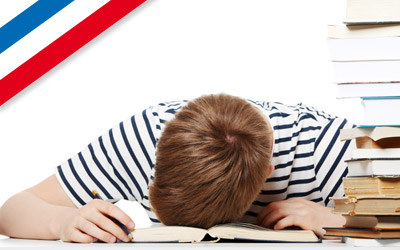5 Things you really need to know about French
nothing
5 THINGS YOU NEED TO KNOW ABOUT THE FRENCH LANGUAGE
Today, we are going through 5 things that you may find out as you go about learning French. We will focus on its use in the world, a bit of its tricky grammar and the things that will make you sound French, or should we say, "look" French...
Amusez-vous bien !
I/ World - It's all over the place!
Along with English, French is actually the only language present on all 5 continents. It's widely spoken in Africa - about half the continent - and in the Canadian region of Québec. Here is a map of what's called "la Francophonie" i.e. French-speaking parts of the world.

The caption reads:
Blue: Countries and territories where French is one of the official languages.
Green: Countries and territories of French tradition.
Orange: Countries and territories where you can live everyday in French.
Brown: Countries and territories where French is a compulsory school subject.
Another official version of this map is available in PDF at: https://www.francophonie.org/IMG/pdf/carte_francophonie_mai_2017.pdf
II/ Official EU language
You may not know that "French is one of the three procedural languages of the European Union, along with English and German, and the sole language used for the deliberations of the Court of Justice of the European Union. French is the sole official language of the Universal Postal Union (UPU)" (Diplomatie.gouv.fr)
English was actually quickly discarded in the competition to become the official EU language as it is obviously already the official language in America - the US and Canada mainly - making it hard to distinguish between the two commissions dealings. While German is widely spoken in Europe, it was agreed that French would "suffer" a gentle simplification of its grammar to make it more accessible. In other words, French was deemed easier to simplify than German, while also retaining its accessibility to a broad number of other EU romance languages (from Latin, not from "romantic") and countries.
Another aspect of French as a European language is the effect it has had on other languages and cultures. Apart from its wide usage during the Enlightenment and in philosophical works, as everyday English speakers, you must know of a few words that come from French. Harry Potter fans out there must have thought about "Voldemort"'s origins; as the name literally translates as "flight-of-death". Here is a short list we thought you'd like:
- grimaces, bourgeois, chauffeur, chic, critique, depot, déjà-vu, ambiance, bureau, café, fiancé, coup, souvenir...
+ ALL of words ending in -ion and -ble.
C'est beaucoup !
III/ French France
France itself is indeed very proud of its language. Apart from the influence it has had over the world and Europe, the French are also deeply attached to their own regional dialects, though most are no longer spoken. You must have heard of the "Bretons", the "Catalans", the "Basques", the "Alsaciens" and the "Cht'is". Whether or not you are familiar with the movie "Bienvenue chez les Ch'tis" or its numerous remakes in Italy and Spain - to only mention a few - it is of common knowledge that France has been a central communication and "meeting" point for a lot of peoples throughout history. Its borders have been discussed and moved dozens of times over the years.
Here, you can find an interactive map of deeply rooted, country-dialects. Click on the name of a city and enjoy:
IV/ Ah, la grammaire !
Unfortunately, you cannot escape it! One of the most important things you need to know about the French language if you want to learn it is that its grammar and verb tenses especially are very different from the English structures.
Sometimes it's more complex, as with the verb endings for each subject pronoun and each tense... We won't go into details here!
Sometimes it can be considered easier than English. For one, modals simply don't exist. That's good news! You won't need to learn the difference between must and have to, may and might, can't and can't:
"I can't come tonight." VS "Ah no, he can't be home; I've just seen him at the gym."
V/ Look it, speak it.
When learning a new language, you should give in to the motto "Fake it 'til you make it." It is so true. While you may think pronunciation is the least of your worries when you're tackling the subjonctif passé, you could actually be putting yourself in the situation where you've done all this hard for nothing, because people can't understand a word you're saying. Visualizing a sentence in your head and getting people to hear it right are two very different things. Even as a beginner, you are able to sound French. You can even sound French when speaking English, can't you?
We always insist you should practice that pronunciation as soon as you utter your first French word. And "Bonjour" is not that easy when you come to think about it. There's a nasal sound in there and the o-u combination!
The good news is you can sound French, and you can look French!
It turns out that the French use a good few gestures and face mimics when they speak.
You can place your index finger under your eye and pull (softly!) downwards to signify that you think someone is lying. It's like saying "Now, don't try to fool me, man."
You could also bring your fist to your nose and "air-twitch" it once or twice (NOT actually twitching your nose) if you want to say that someone is drunk.
You can pout to express your disgust, and even let a sound out of your pouted lips while shrugging your shoulders - or even just one shoulder - to make a point that you just don't know or don't care. It's similar to the English "Meh".
To say someone is crazy, just bring your index finger to your temple and twist it or knock gently.
You are now ready to learn French, congrats! Check out our online lessons, et c'est parti !
Thanks for visiting!
Some other stuff here
This Course
Basic French

Just getting started? Here are all the basics, from introducing yourself, to numbers, the alphabet and loads more crazy Gallic stuff.
Other sections in this course
Real French I

Forget the textbooks. Here's the sort of informal French you'll hear amongst friends.
It's the type of really practical language that you'll use all the time in casual conversations, but nobody's actually ever bothered to teach you. Until now.
1.2: Show me more!

You've learnt the basics (Tell me you've learnt the basics!) and want to move on? Let's look at likes and loves and a whole load of other stuff.
Basic French Grammar

Your starter's guide to French grammar rules.
1.1 Know nothing? Start here!

Bienvenue to our series of classes for anyone starting to learn French, or those of you who were smoking behind the bike sheds when they should have been in French class.
Our focus in these classes is on real, practical examples which you can start to use straight away. We'll keep grammar to a minimum, promise!
1.1 Know nothing? Start here!
Other classes in this section:
My First 20 French Phrases

Who says you have to start with boring grammar? Here are the first 20 French phrases you'll want to know if you are just starting to learn French.
My first 30 Questions in French

A great introduction to forming questions in French. From asking for directions, ordering in a restaurant, to finding out if that cute guy/girl is married or not. Here's out guide to the top 30 French questions for beginners.
The ten most common French verbs

Let's get started on French verbs with 5 of the most common. We've also included loads of examples phrases and questions.
Numbers in French

The French numbers up to 100, including all those crazy numbers from 70 to 99. Audio provided.
5 Things you really need to know about French

Talking about ourselves

nothing
